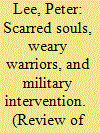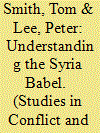|
|
|
Sort Order |
|
|
|
Items / Page
|
|
|
|
|
|
|
| Srl | Item |
| 1 |
ID:
123355


|
|
|
|
|
| Publication |
2013.
|
| Summary/Abstract |
Over the past three decades Jean Bethke Elshtain has used her critique and application of just war as a means of engaging with multiple overlapping aspects of identity. Though Elshtain ostensibly writes about war and the justice, or lack of justice, therein, she also uses just war a site of analysis within which different strands of subjectivity are investigated and articulated as part of her broader political theory. This article explores the proposition that Elshtain's most important contribution to the just war tradition is not be found in her provision of codes or her analysis of ad bellum or in bello criteria, conformity to which adjudges war or military intervention to be just or otherwise. Rather, that she enriches just war debate because of the unique and sometimes provocative perspective she brings as political theorist and International Relations scholar who adopts, adapts, and deploys familiar but, for some, uncomfortable discursive artefacts from the history of the Christian West: suffused with her own Christian faith and theology. In so doing she continually reminds us that human lives, with all their attendant political, social, and religious complexities, should be the focus when military force is used, or even proposed, for political ends.
|
|
|
|
|
|
|
|
|
|
|
|
|
|
|
|
| 2 |
ID:
175590


|
|
|
|
|
| Summary/Abstract |
The war in Syria, and its ongoing analysis, is burdened by a variety of seemingly irreconcilable political motivations, actions, ideologies, religious affiliations, and power dynamics of multiple state and nonstate actors. In this context, various moral perspectives appear to come into direct conflict, underpinning the actions of the actors involved and to varying degrees influencing their competing political interests. Is there a coherent dialogue of moralities between the rivals involved or is Babel reborn with moral claims being launched but with no real exchange of meaning involved? On Syria, the answer is a complicated mixture of both but within which are important and as yet underappreciated patterns of convergence and divergence. This article looks at the leading states involved as well as the role of individuals to elucidate this pattern of overlap and difference in the morality discourses surrounding Syria. Ultimately, it is argued that a moral Babel is not reborn in Syria: there is sufficiently common moral language being used by all sides for a degree of shared meaning to emerge. The challenge is for the protagonists to listen and really hear what is being said and work with those commonalties as tools toward peace.
|
|
|
|
|
|
|
|
|
|
|
|
|
|
|
|
|
|
|
|
|